Sustainable Living Guide
Sustainability is a vital part of life at the University of Leeds, including living in our residences.
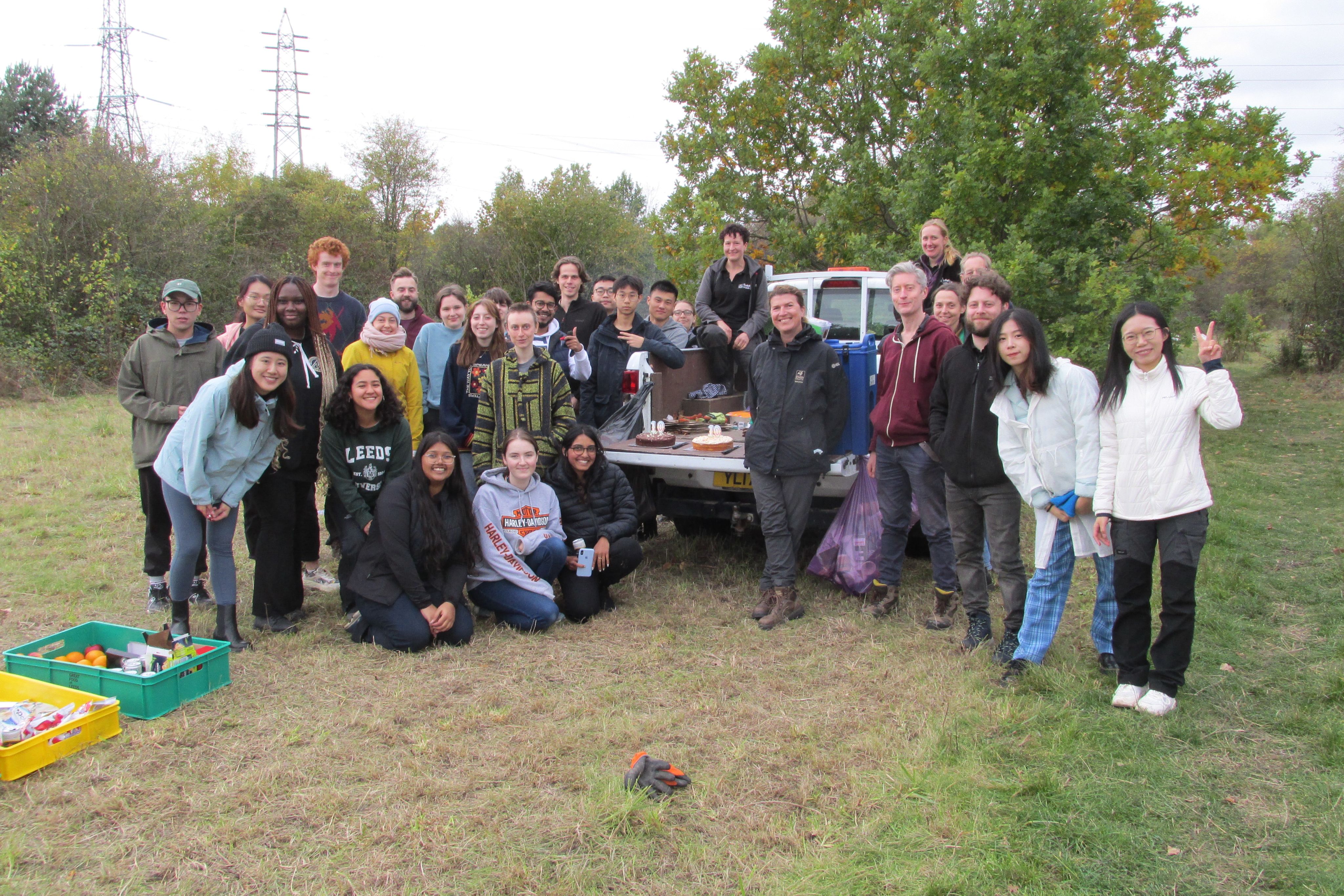
Sustainability is a vital part of life at the University of Leeds. Across the University we take our economic, environmental, social and cultural impacts on our local and global community seriously, and this includes in our University residences.
The University’s sustainability strategy is underpinned by the United Nations Sustainable Development Goals, and Residential Services publishes an annual report on how it meets the key themes of this strategy.
Reducing our impact on the environment requires us to work together in collaboration. Our Sustainable Living Guide tells you how we seek to improve sustainability throughout our residences, and what you can do to help achieve these goals.
The guide covers the following topics:
- Sustainability at the University of Leeds
- Sustainability in Residential Services
- Sustainability awareness and behaviour
- Circular use
- Your Leeds community
- How to reduce your climate footprint
- Waste and recycling
- Travel and transport
- Biodiversity and ecology
- Our Blueprint and Blueprint Plus actions
Sustainability at the University of Leeds
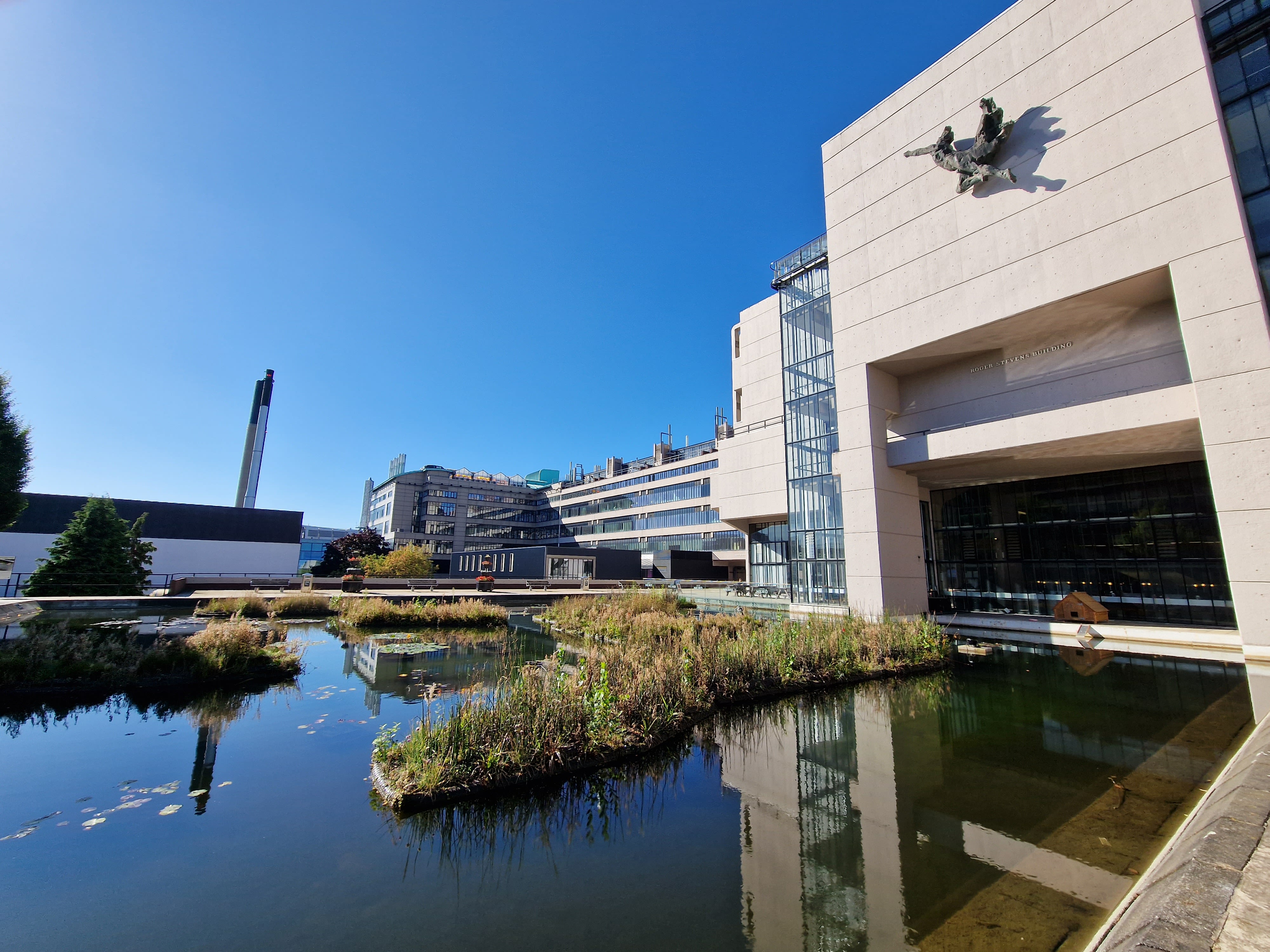
There are over 40,000 students and staff at the University of Leeds and every one of us has a part to play in building a sustainable future.
Our vision
Our vision is to become a University where sustainability is truly embedded through knowledge, engagement, collaboration and innovation.
We will do this by:
- Embedding sustainability through collaboration
- Building knowledge and capacity
- Being a positive partner in society
- Making the most of resources.
Find out more about our progress so far as well as opportunities for you to develop your skills and get involved on our website or by signing up to our newsletter. You can also follow us on social media: Facebook, Instagram & Twitter
There are many ways to get involved with sustainability whilst you are in Leeds:
- Sustainability is part of being a student at the University of Leeds, no matter what your discipline. Find out more about opportunities open to you, including the Annual Student Sustainability Research conference, funding for research projects, and Discovery module options via the "curriculum page" on the sustainability website
- University life means living amongst, socialising, and becoming part of the wider Leeds community. What we do as individuals impacts on our communities and city. Further details about living in Leeds and how you can positively contribute can be found on the "social responsibility" page on the sustainability website
- Find out more about active travel and hire a bike to get around on the bike hub website
- Visit our green spaces on campus and get involved with growing biodiversity and urban gardening through Living Lab projects and the University’s Sustainable Garden on the biodiversity website
- Apply for a paid internship or part-time position with Sustainability Services. For further details visit the "get involved" page on the sustainability website
- Volunteer in the local community and help provide a positive impact, whilst gaining new skills. Find out more via the "volunteering page" on the sustainability website
- Find out more about Blueprint, our University-wide programme for supporting schools and services to deliver sustainability action plans
- Play your part in helping us to meet our pledge to be single-use plastic free by 2023 by reading our plastic pledge
- Follow us on social media to keep up to date with opportunities to develop sustainability skills for your future career, meet new people, and lead the way as the next generation of responsible citizens on Twitter, Facebook and Instagram
Sustainability in Residential Services
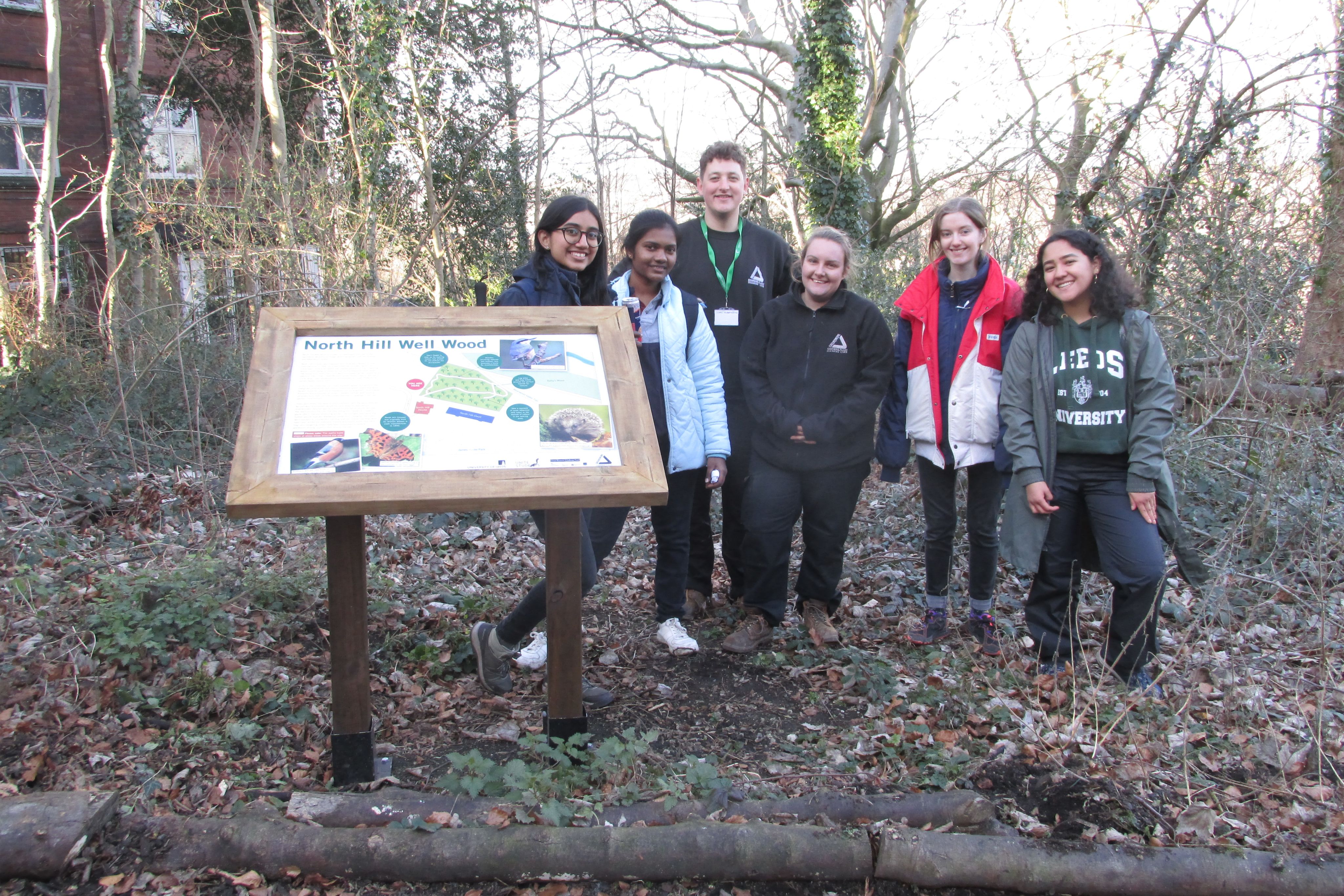
Residential Services manages the residential accommodation portfolio owned or nominated by the University of Leeds, currently providing around 9,000 bed spaces. Residential Services operates according to the University’s Sustainability Strategy and has bespoke 5-year Blueprint and 10-year Blueprint Plus actions identified to positively address the following top ten environmental, social, and economic aspects:
- Environmental awareness and behaviour
- Circular resource use for goods and services
- Use and storage of chemicals and cleaning products
- Use and storage of fuel and oils
- Energy and carbon emissions reduction
- Waste and recycling
- Building design, refurbishment and maintenance
- Biodiversity and ecology
- Travel and transport
- Saving water
In addition, a number of our conference-facing residential sites are also listed as Gold Standard for a sustainable business operation, under the hospitality sector’s Green Tourism accreditation scheme
- Dobree House, Storm Jameson Court, and Whetton House (2011)
- Devonshire Hall, Ellerslie Global, and Lyddon Hall (2012)
- Henry Price Residences (2013)
- Central Village (2019)
The University of Leeds has been recognised as a leading Green Tourism ambassador by the scheme, with the work of our sites at the heart of that achievement.
Sustainability awareness and behaviour
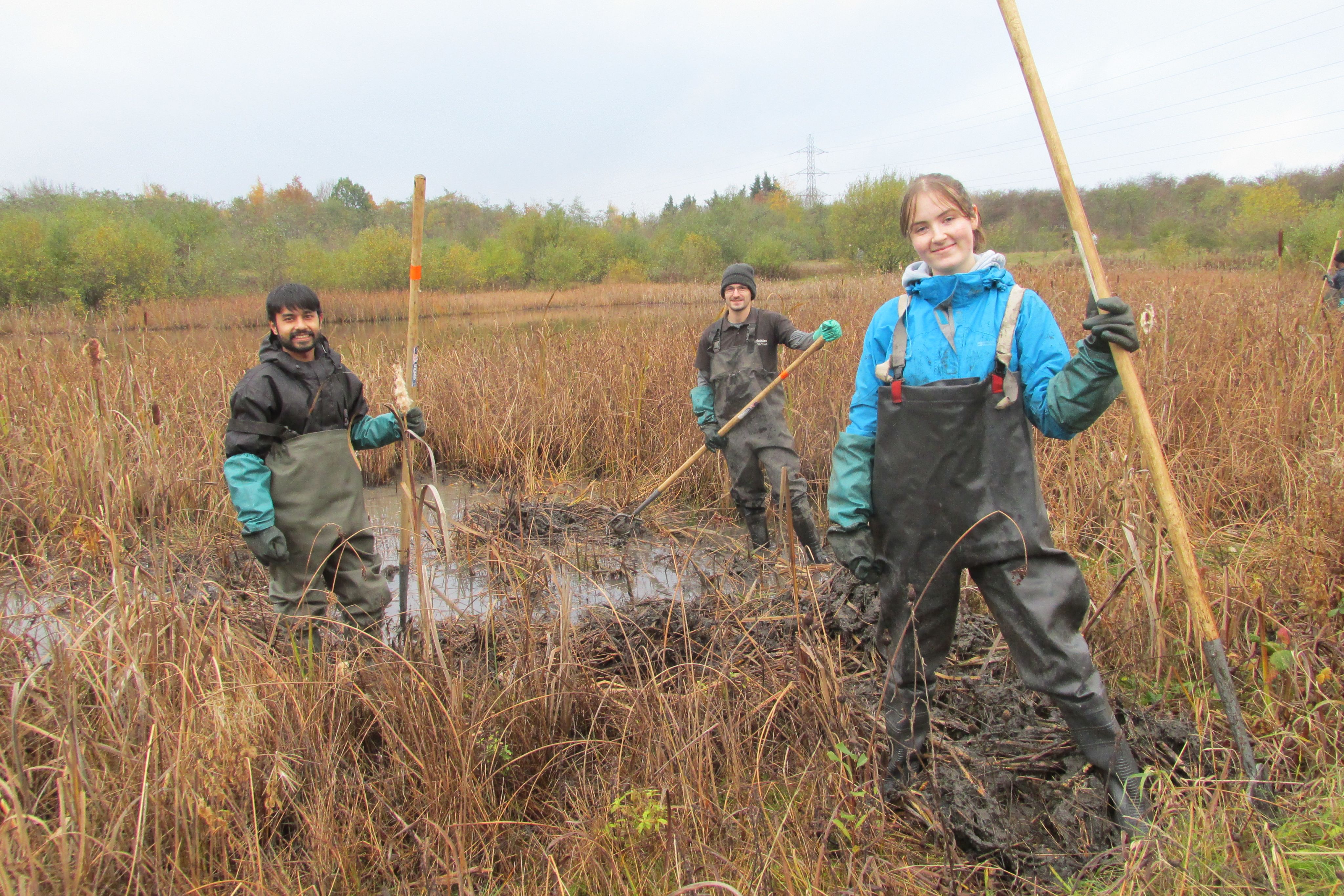
Residential Services is working hard to reduce its environmental impact and you can read more about our Blueprint Action Plan, which underpins our actions, at the end of this guide.
With big, complex challenges like sustainability, it can sometimes feel as though our own individual actions are too small to make a difference. But if we all make more sustainable choices more often, then we can achieve significant change.
Top tips:
- Please read and follow the advice provided in this guide
- Talk to your flatmates and try to share and cook together more, this helps you to avoid all buying the same items or food that might go to waste
- Contact the University’s Sustainability Team and/or Leeds University Union, to see what you can do to help on campus and in the local Leeds area
- Think about how your day to day actions impact on the world around you. The things we buy, the way we use them and how you dispose of them when finished are all important to consider when thinking about how we can live more sustainably. You should also consider the means by which we get around and the ways in which we treat others.
- Find out how you can learn about sustainability as part of your course by exploring the Discovery modules available to you.
- Be sure to look after yourself too – good health and wellbeing is one of the United Nations Sustainable Development Goals. Learn more about getting active on campus and the wellbeing support available to you through the University.
Circular use
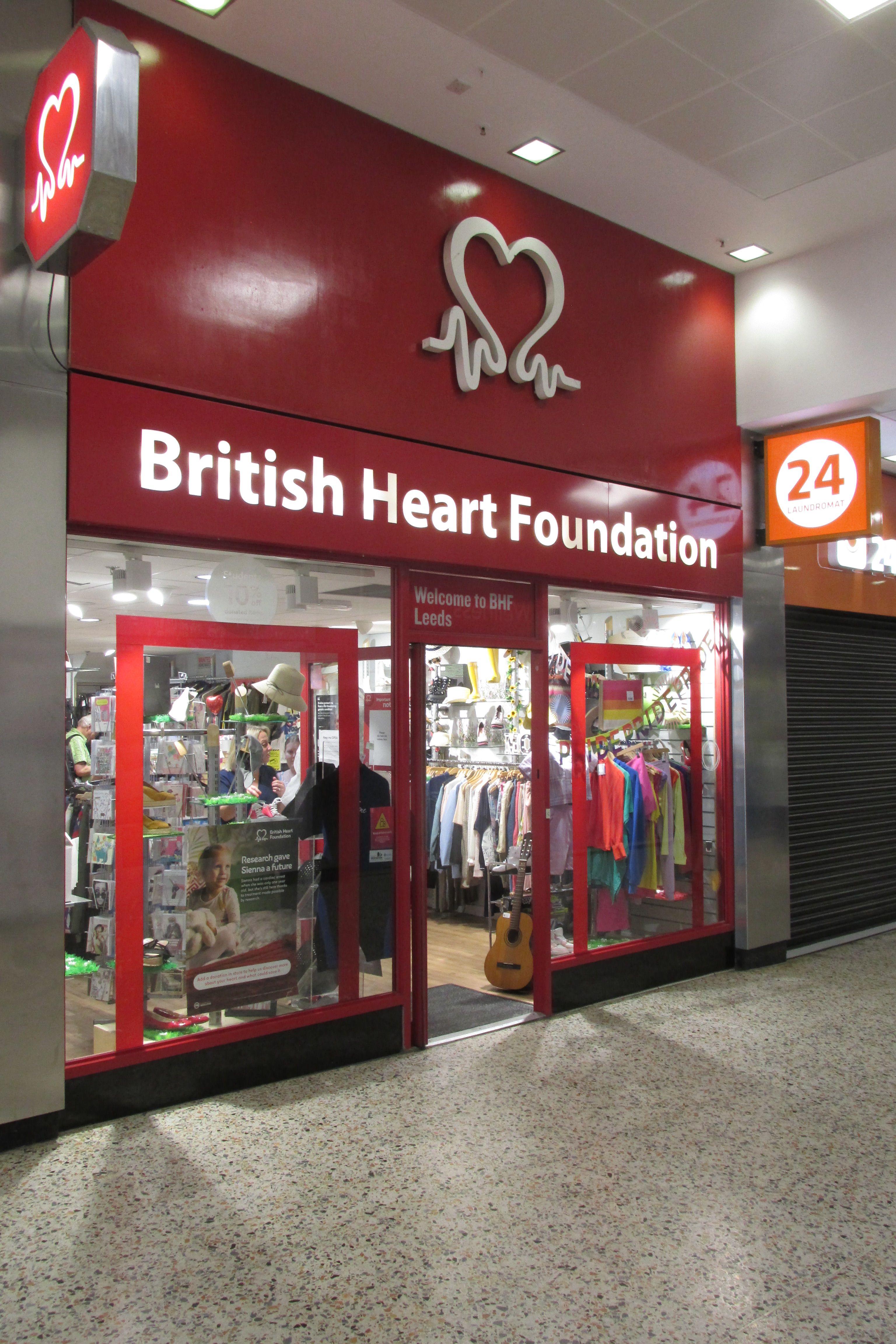
The University of Leeds encourages its suppliers and contractors to improve their performance and to ensure that goods and services are procured to support the University’s sustainability strategy.
The University also seeks to adopt a circular approach to resource use, by promoting the need to Reduce; Re-use; Recycle, and Restore.
For example, mattresses and beds are collected from University residences by suppliers who then re-use their materials helping to prevent waste. New mattresses have been designed with longer life spans and are made of eighty per cent recycled content, thereby contributing to a circular resource economy.
Top tips:
- Consider any purchases before you buy: their source; what they are made from; and can you do without them? Try to avoid buying single-use plastic products and carrier bags.
- Try to use local pop-up shops, charity shops, markets and other community-based retail outlets. 64,167 individual parcels were received in University residences during 2021/22, resulting in a large volume of waste cardboard and packaging being collected and recycled.
- Visit The Refectory on campus for meals that use locally sourced ingredients, and for options that can cater for all dietary and ethical needs. Visit our catering site for more information.
- Check out Kirkgate Market in Leeds, which boasts over 500 stalls in an impressive Edwardian building via the Leeds City Council website
Your Leeds community
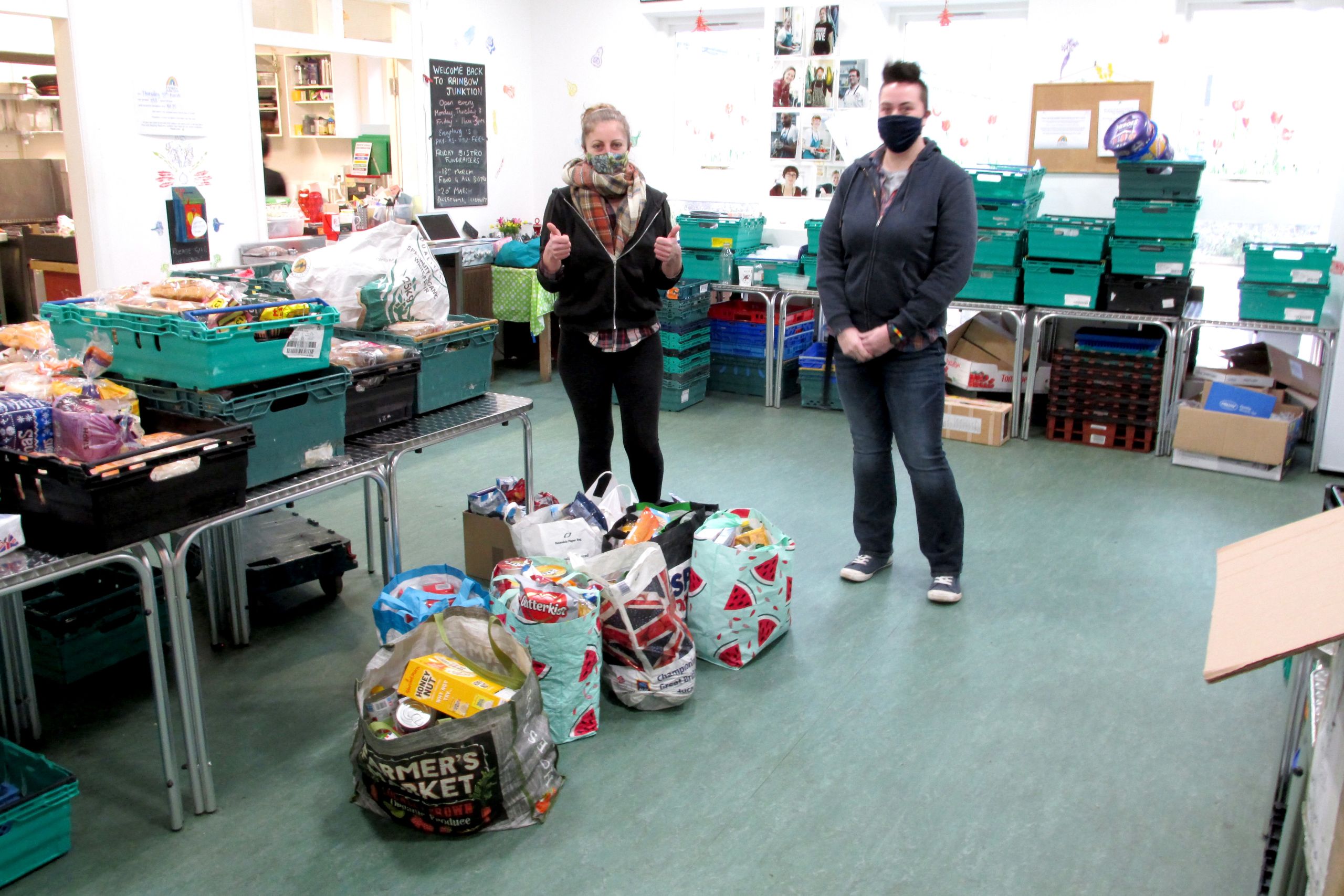
By joining us at Leeds you are joining a diverse and culturally rich community, not just at the University but also in the city. At Leeds, everyone is treated fairly, with dignity and respect and we expect our students to show the same respect for other students, our staff and local residents.
Getting involved with the local community is easy, enjoyable and rewarding. There are many different ways to do this but the best thing to do is get out and about to get to know the local community. You can also consider volunteering with local schools and community organisations to supporting local events and projects. You can make a great and positive contribution to our city, the wider UK and global society.
Moving away from home and joining a new community can be pretty daunting – there are lots of new things for you to know and be responsible for. It’s important you take the time now, before moving out to the local community next year, to get to grips with independent living and your increased responsibilities. We will help guide you on your role as a Leeds resident, helping you to avoid the pitfalls of living independently for the first time and ensuring that your time in Leeds is a positive and rewarding experience.
Top tips:
- Find out more about volunteering through Leeds University Union and the Sustainability Service
- To find and support local and independent businesses visit the Leeds Independent Life website
- Donate non-perishable food to local food banks (such as Rainbow Junktion in photo above), and/or unwanted items to local charity shops
- Leeds is a big and vibrant city with lots of events and opportunities to explore the city, the Visit Leeds website has lots more information about what is going on
- Take part in local elections: register to vote
- To explore further afield, including the beautiful Yorkshire countryside, picturesque coast and historic towns, head to the Visit Yorkshire website
- For information and guidance check out the Your Time in Leeds section on the For Students website
- Join in with our volunteer days with Yorkshire Wildlife Trust (advertised on Residence Life website)
How to reduce your climate footprint
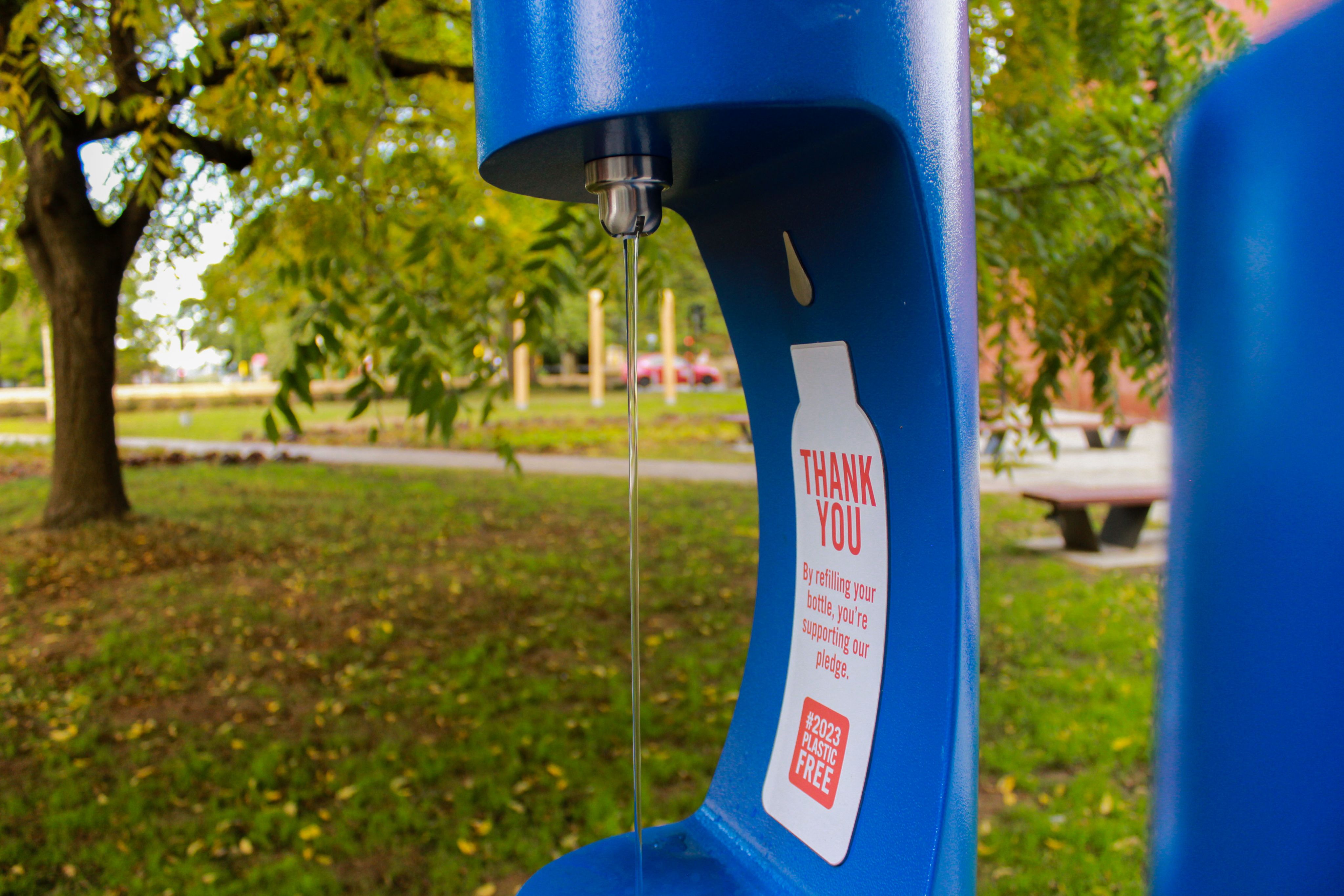
In 2019 the University agreed on seven principles to help tackle the climate crisis
The principles include commitments around responsible investment; achieving net-zero by 2030; supporting the city of Leeds in achieving net-zero by 2038 and integrating sustainability into teaching. A Climate Plan is currently under development that will direct activity to achieve the seven principles. Residential Services has been reducing its energy and carbon emissions since 2010 and will be supporting the delivery of the Climate Plan. For example, at Sentinel Towers we have installed new electric radiators with Bluetooth controls to reduce unnecessary energy use (2022). We also installed 7,386 LED lightbulbs across our sites during 2022/23 and have purchased two new electric vehicles meaning that four out of our six Residential Services vehicles are electric.
Preserving water supplies is also important, not only due to the uncertainty of its availability but also because of hidden energy costs associated with its production and supply.
About 90-95% of the water that we use at residential sites ends up going into the drains or sewerage system, where further energy is used in its treatment at local waterworks. If we can reduce the water that we use for drinking, cooking and washing, we can also reduce the discharge to the sewerage system. Learn more on the Water Wise website.
The University is seeking to reduce reliance on mains-fed water for its operations and has incorporated the installation of rainwater harvesting systems at Storm Jameson Court, for use in flushing toilets. In addition, local mains pressure is tested at sites, and pressure reducing valves are fitted where possible. Finally, lo-flo showers and dual-flush toilets are installed where this is feasible, eg Montague Burton refurbished blocks (2016-18).
Top tips:
- Familiarise yourself with the heating controls in your accommodation, eg. push4heat, radiator valve, and/or thermostat. Ask Residences staff to show you if you are uncertain
- Report any problems with your heating, lighting, water supply or building to Residences staff
- You can ask Residences staff about both environmental issues and the energy efficiency of your accommodation, and what has previously been done to improve them
- When cooking/making a drink, only fill your kettle/pan with enough water for your needs
- When washing up, please use the sink or washing up bowl, and don’t wash your plates and cutlery under a running tap
- Turn the shower on when you get in and not before, and don’t leave it running afterwards
- Report any problems with dripping taps or leaks to Residences staff, as quickly as possible
- Use refillable water bottles or ‘Keep Cups’, and replenish them at water refill points or dispensers around campus
Waste and recycling
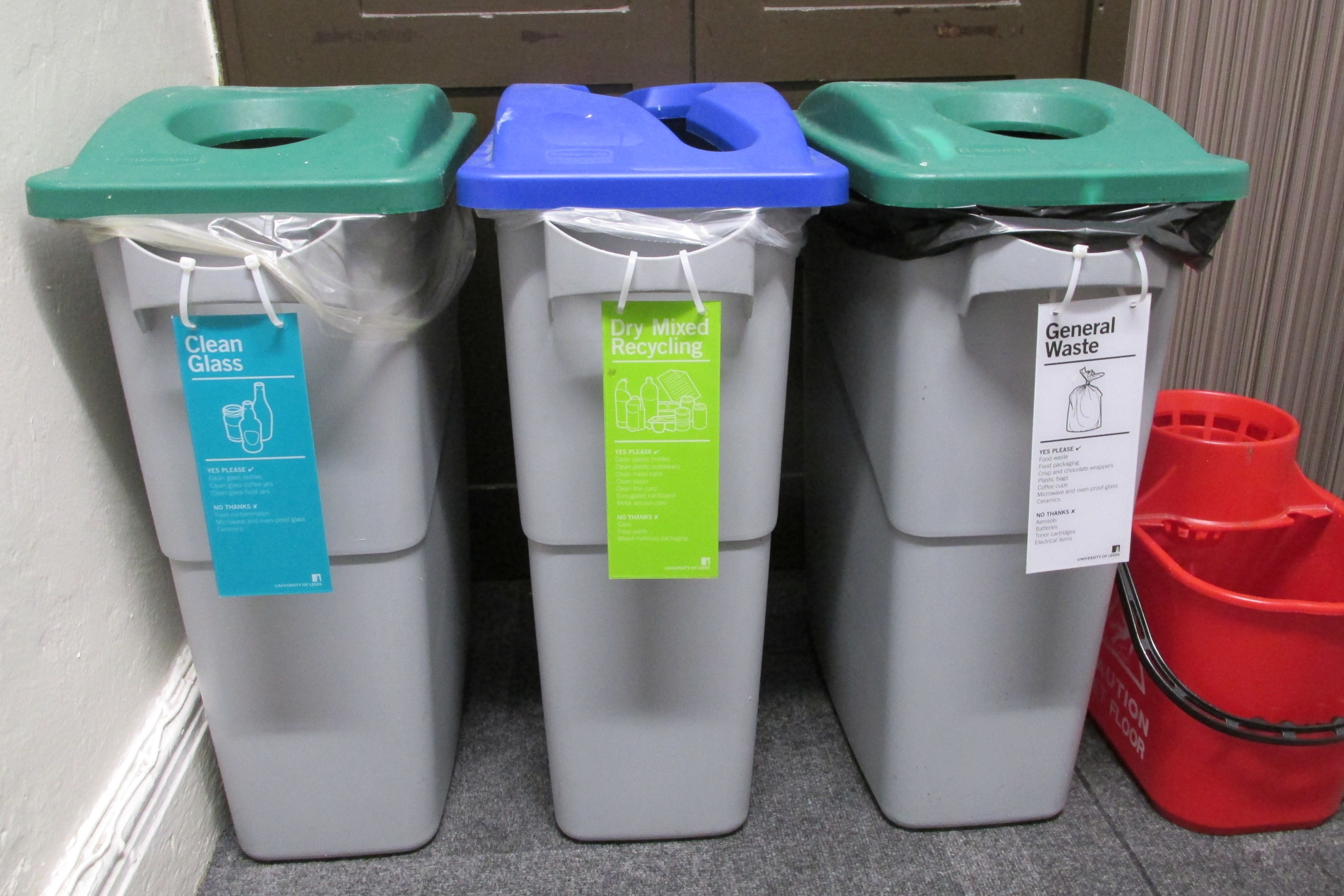
The University of Leeds in collaboration with Leeds University Union has pledged to become single-use plastic-free by 2023. All staff and students can help the University achieve this target by reducing their consumption of single-use plastic and identifying operational changes to support the pledge. The University is working with its supply chain to address this challenge going forward.
In addition, the University also seeks to reduce the amount of waste and recycling generated in its operations through a circular resource approach of Reduce; Re-use; Recycle, and Restore.
Within University residences, 64,167 individual parcels were received in University residences during 2021/22, resulting in a large volume of waste cardboard and packaging being collected and recycled. Student lifestyles and behaviour can create a large amount of waste and/or recycling, so bins for dry mixed recycling (card, metal, paper and plastic) are provided in all University-owned accommodation, together with bins for glass recycling and general waste. Information is provided on both bin tags and posters in the accommodation, and students are encouraged to ask site staff if they need any further information on what they can recycle.
Depending on whether you live in University-run accommodation, private provider run accommodation or in a private rental property you may have a different recycling provision. Have a look at the University website and the Sustainability website for more information on recycling at home and on campus.
Top tips:
- Reduce your purchases wherever you can, and avoid buying single-use plastic packaged items, food, and carrier bags
- Reuse as much as you can, invest in Bags for Life, Keep Cups, and reusable food containers and water bottles
- Recycle clean cans, tins, bottles, jars, cardboard and paper, in the recycling bins provided in your accommodation
- Take home what you don’t need at Christmas and Easter, and donate any items that you don’t need in the British Heart Foundation collection bins before you leave at the end of your course
- Further advice on recycling is available via the Wrap website
- If you want more information about recycling at your accommodation, speak to your residence site team
Travel and transport
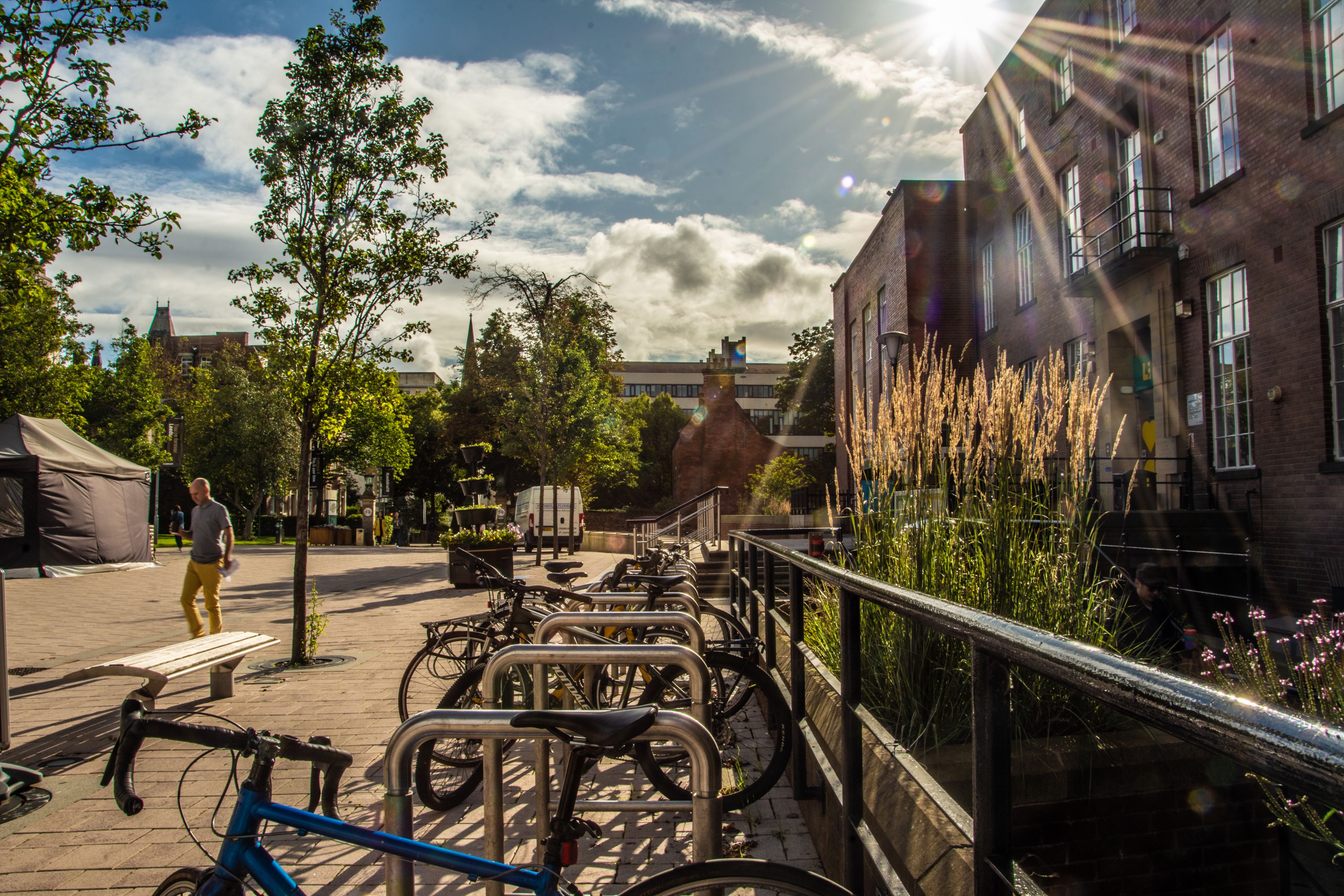
91% of students living in University residences walked between campus and their residence (2022/23), whilst only 0.5% use a car. Walking and cycling are an important part of the University’s plans to build back better in response to covid-19 and Leeds City Council are investing 100km of pop-up cycle lanes to support this. Learn more about sustainable ways of travel on the sustainability website
Four out of the six vans used by Residential Services are electric and emphasis is placed on using the electric vehicles whenever possible. Vehicle mileage is monitored on a monthly basis, to show that the electric vehicles are being used more than the diesel vehicles.
Information and opportunities are provided for students, staff and visitors to use more sustainable forms of public transport on the Traveline website, and bicycle storage facilities are also available at all large University residential sites.
Top tips:
- Please avoid bringing a car to Leeds, there are plenty of other ways to get to campus and to travel around the city
- Visit the sustainable travel page for advice or ask the staff at your residence
- If you want to give cycling a go whilst you’re in Leeds the University’s Bike Hub allows you to hire a bike for three months for just £22
- Secure cycle storage spaces are provided at all large University residences, but we would also advise that you use a strong reliable D-lock (available for loan from your site office), to keep your bike secure when out and about in Leeds
- For details on public transport travel cards and discount schemes, please refer to the public transport page on the sustainability website
Biodiversity and ecology
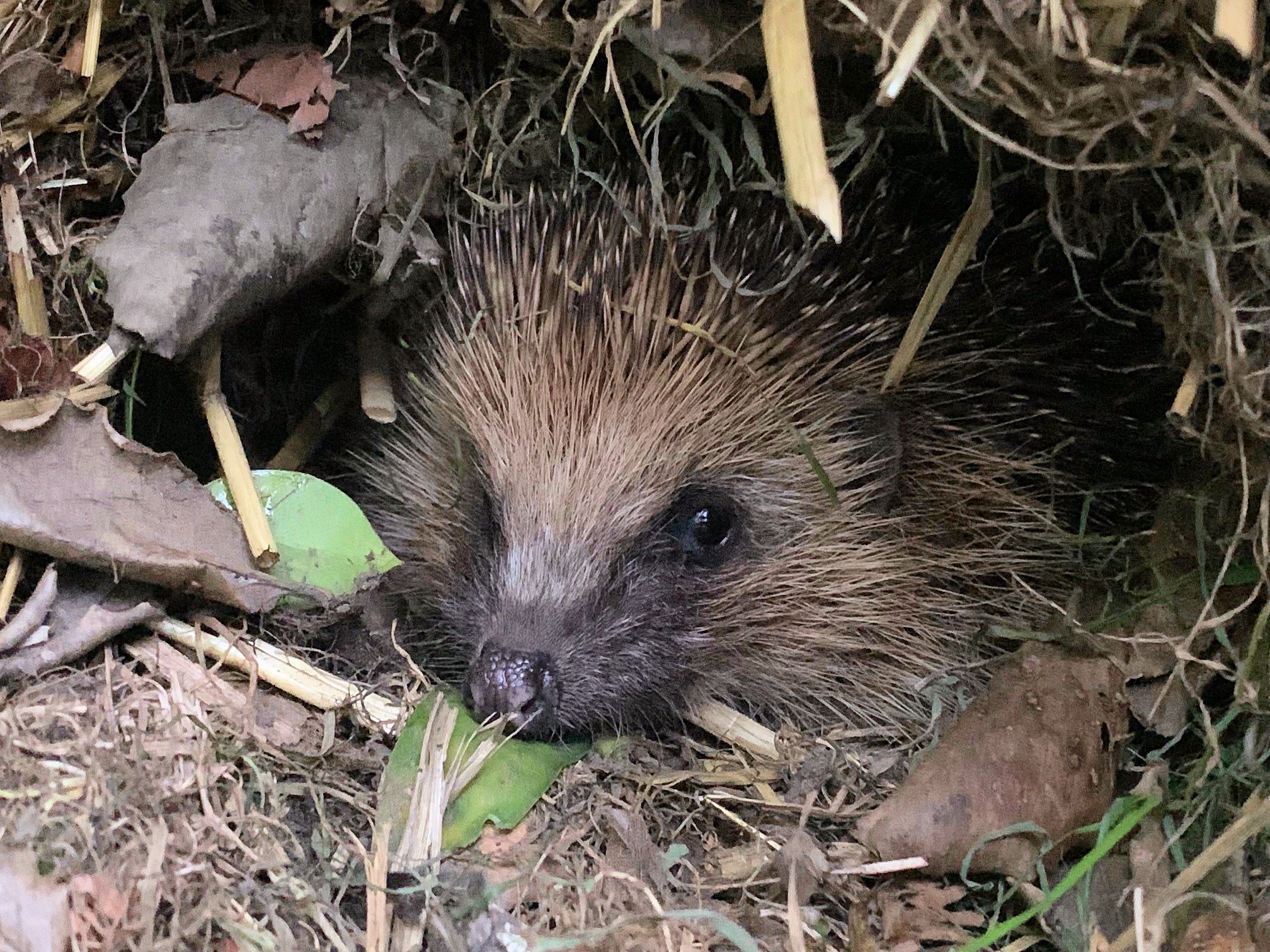
The University of Leeds seeks to maximise the biodiversity and ecology across its urban estate, by enhancing existing trees and plants, with increased connectivity, year-round interest, and plants that are attractive to invertebrates, birds and other wildlife. Recent multi-service/faculty projects include the Sustainability Garden, the Sensory Garden at Charles Morris Hall, the North Hill Well Wood, the Roger Stevens Pond, and the open area at the rear of Leeds University Union, between Charles Morris Hall and Stage@Leeds.
The University is also proud to be a corporate member of both the Royal Society for the Protection of Birds and the Yorkshire Wildlife Trust. In addition, Residential Services has worked with Buglife’s Urban Buzz Project, the Great British Elm Experiment, the Hedgehog-Friendly Campus scheme and the Woodhouse Ridge Action Group here in Leeds.
A number of Wild Work or Volunteer Days are held with Yorkshire Wildlife Trust each year, and students and staff have the opportunity to work on projects in the Aire Valley catchment, from Skipton down to Pontefract. Our Student Sustainability Architects (recruited each year) have surveyed 12 out of our 14 owned sites and produced recommendations for how we can improve their biodiversity.
Top tips:
- Find out more about biodiversity on campus and how you can get involved with our projects
- Look at the information provided by Yorkshire Wildlife Trust for volunteering opportunities on local reserves in the Leeds and West Yorkshire area
- You can volunteer with LUU Conservation Volunteers in the local area
- You can also volunteer with Woodhouse Ridge Action Group
Blueprint
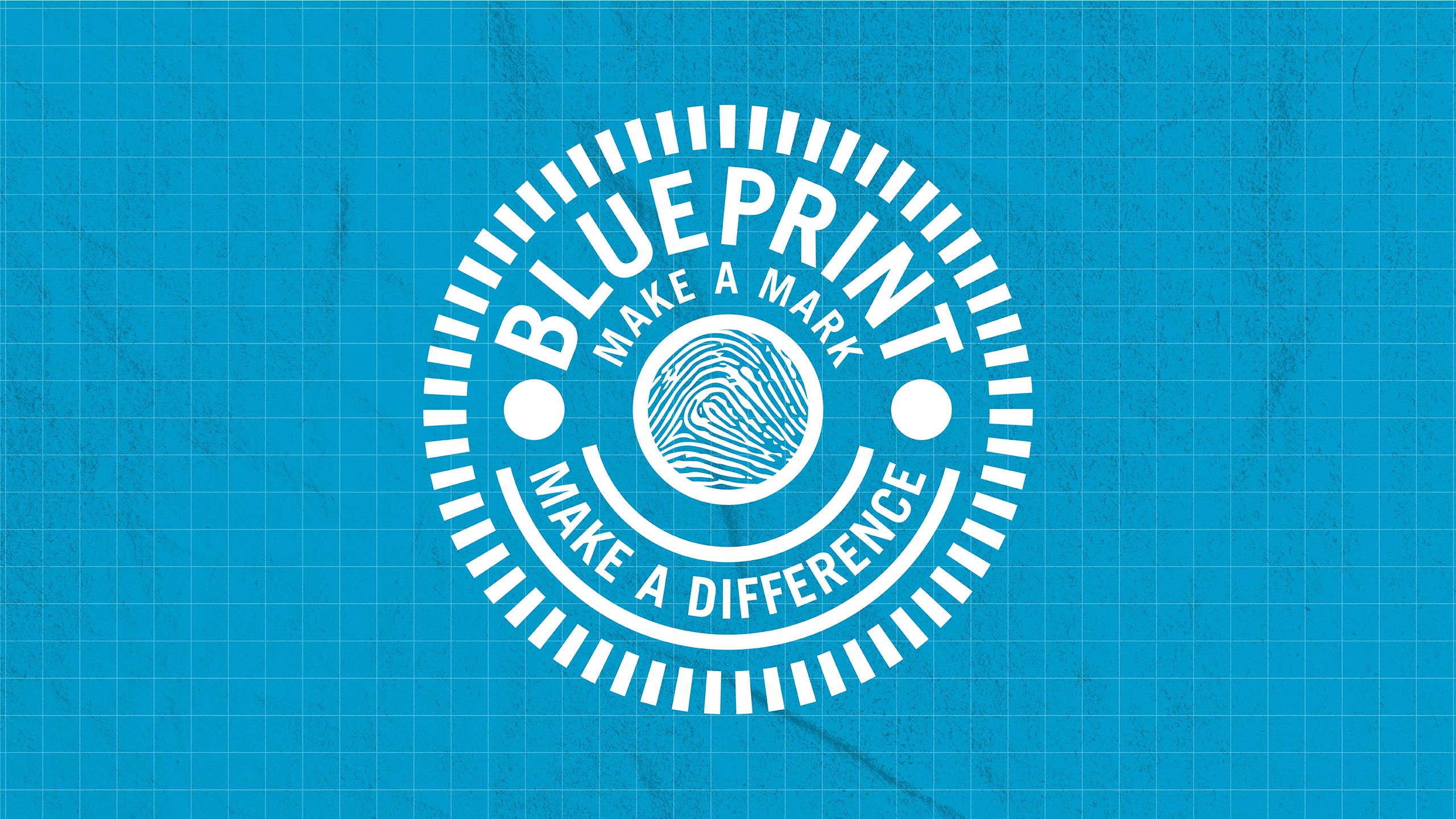
The University of Leeds Sustainability Service Blueprint framework supports schools and services to understand their sustainability impacts and what changes they can make to help deliver against the University’s sustainability goals. Find out more about the Blueprint framework
The actions that we take here at the University of Leeds can have positive environmental, social, and economic impacts, helping us all to create sustainable change
Here in Residential Services we have our own bespoke 5-year Blueprint Action Plan and you can see our progress so far below.
Blueprint actions
- Produce an annual sustainability report by end of 2019, in line with the University Sustainability Report, and a Sustainable Living Guide.
– Completed in December 2019. - Develop and deliver a 5-year plan to adopt total removal of single-use plastics across the service by 2023. To meet this goal zero waste chemicals were introduced in 2020 with biodegradable cardboard packaging.
– Introduced from 2018/19 onwards. - Encourage and support students to remove single-use plastics from their daily lives in University Residences.
– Introduced from 2020/21 onwards. - Create a waste and recycling campaign that is aligned with the campus campaign, and to monitor and report progress.
– Introduced from 2018/19 onwards. - Create inclusive and welcoming outdoor environments that provide health and well-being benefits for all. An accessible ramp and landscaping were introduced around Charles Morris in 2021. From 2022 collaborative work has been undertaken on the new North Hill Well Wood to improve access, plant new hedging, trees, ferns and woodland plants to attract wildlife.
– Introduced from 2017/18 onwards. - Ensure that Residential Services support the development and contribute to the delivery of the University Carbon Management Plan beyond 2020/21
– Introduced from 2010/11 onwards. - Maintain a vehicle fleet to support the University’s Clean Air Pledge, and communicate the benefits to the wider University.
– Residential electric vehicles covered 66% of mileage in 2021/22. - Showcase sustainability success stories internally and externally to the University and external partners.
– Residential Services achieved a Blueprint Visionary Award at the Sustainability Awards for 2021/22 and won the University’s Protecting Our Planet category in 2020/21 - Recruit and support staff and student sustainability architects.
– We have recruited two student sustainability architects a year since 2018/19 - Map biodiversity value and create biodiversity action plans for all residential sites.
– 12 sites completed out of 14 so far by end of 2022/23 - Support students living in Residences, in learning how to live independently in Leeds
- Identify sites for investment in renewable energy
– Achieved with the completion of the Montague Burton Hub in 2019/20 - Provide knowledge, skills development and experience that enable students to positively contribute to society, through LUU and Sustainability Services programmes
- Ensure opportunities exist for students and staff to get involved in wider activities with external partners.
– Tenth anniversary of organising for staff and student volunteers to work with Yorkshire Wildlife Trust in October 2022 - Proactively identify and support opportunities for Residential Services to engage with the Living Lab programme.
– Since 2017 we have supported projects such as Food Waste at Devonshire and Campus Biodiversity Ambassadors
Blueprint Plus Actions
- Residential student recycling levels are to be similar to those for the campus
- A full life cycle solution was identified for mattress reuse/recycled content in new mattresses.
– Completed. Bishops Beds replace our old mattresses with new ones made of 80% recycled content – the old ones are then stripped down for recycling - All sites to have provision for food waste recycling
- Effective programmes in place to encourage a reduction in student consumption and removal of single-use materials
- Circular resource use, including leasing, sharing, re-use, and remanufacturing of equipment across all operational areas.
– Ongoing. We work with various supply chain partners to do this, including the repair of external waste and recycling bins by Bin Masters - Service commitment to net-zero carbon sites in a strategy, with targets
- All refurbishments and new-build projects support sustainability objectives and targets
- Low and zero-carbon assessments are undertaken across all sites for feasibility
- Identify key climate change adaptation risks, and solutions planned accordingly
- Third-party accommodation providers adopt Residential Services sustainability principles and practices
- Walking and cycling provision and support is excellent across all University residential sites. We work towards this by promoting the University’s Bike Hub and by offering free D-locks from site offices
- All residential sites will have action plans in place that support the University’s aim to be an exemplar of urban biodiversity.
– Ongoing. 12 out of 14 sites have been completed so far - We will support the provision of education and support programmes in collaboration with volunteers and other services, eg. Leeds University Union and Sustainability Services
- All of our students will be given greater opportunities to live sustainably in their accommodation
- We will actively support the well-being and mental health of our students through pastoral care, peer-to-peer training and events through our Residence Life programme
- Our staff will become leaders of sustainability and will support a culture of sustainability that influences decision making daily.
– Ongoing. We were confirmed as a Green Tourism Ambassador in 2020 and achieved a Blueprint Visionary Award 2022 - Residential Services purchasing will support University sustainability principles, providing best practice examples
- Residential Services actively supports other services and schools to become more sustainable
- Residential Services is actively seeking to reduce the impact of chemicals in operations.
– Ongoing. We introduced the Purex ionized water cleaning system at Charles Morris in 2018, and zero waste chemicals across sites in 2020 - Residential Services maintain the highest standard of Green Tourism Award across applicable sites and is actively seeking to improve upon performance.
– Since 2019, Charles Morris, Central Village, Devonshire Hall, Ellerslie, Henry Price and Lyddon have all achieved a Green Tourism Gold Award